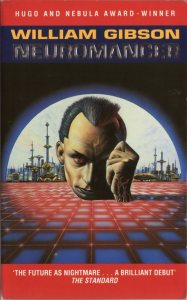When life takes an unexpected left turn I do four things – tidy my room, go running, take 72 hours away from anything stressful…and read a good book.
This time around I landed on Neuromancer by William Gibson. I first read this book when I was 14, I suspect I read it at least seven our eight times before I was 20, and if I had to point at one cause for ending up in the scifi industry, Gibson’s novel would likely be it.

Going back to such an influential book after an 18 year time lapse is…risky. I also really liked Dragonlance books when I was 14, and let’s just say those didn’t hold up when I last re-read one. But from the iconic first sentence onwards, Neuromancer didn’t just hold up to, it exceeded my expectations.
Yeah, cyberspace, virtual reality, Artificial Intelligence blah blah blah. Praise for Neuromancer tends to focus on the ideas, and those are certainly there. But coming back to the book with two decades writing experience under my belt, what floored me is just what a spectacular feat of storytelling it is.
Firstly, Gibson writes that rare beast, a truly cinematic novel. Neuromancer weighs in at around 80,000 words – a short book by today’s standards. In that space Gibson constructs a near perfect 3 act structure. Many Neuromancer film adaptations have been rumoured, none have ever materialised, perhaps because of the pretty awful Johnny Mnemonic. If a filmmaker ever does adapt Neuromancer, they could use Gibson’s manuscript beat for beat as an edit decision list. The prose is so spare that Gibson turns entire scenes in a few sentences.
Subscribe to the Science Fiction podcast
Insights and interviews on the art and craft of 21st century myth making.

This is only possible because Gibson’s visual imagination is balanced with a poetic sensibility. Nikon eye implants, the scent of German steel, a white cube AI hiding in the consensual hallucination that is the matrix. Gibson isn’t interested in ideas so much as the poetry that the language of ideas creates on the page. There aren’t many poets in the science fiction field. In fact, you could argue that Gibson is the only one.
I write this knowing that, of course, you all aren’t going to agree. Subjective aesthetic standards, etc, not everybody likes the same thing. I’ve never entirely bought that line of argument. Preferences are subjective, but quality is rather more objective. Not everyone likes Porsche sports cars, but few people would tell you they’e low quality. There’s a reason Neuromancer has sold 6 million copies and counting, amidst a science fiction genre where most books sell only a few thousand…it’s brilliant storytelling, in a genre that tends to overlook the value of story.
“Hard SF”, that part of the genre that is all about the science, has a problem with storytelling. Perhaps it’s because the story is the humanistic part of the equation, and the personalities drawn to scientific speculation and futurism have a bias against the “soft” arts of communication, persuasion, composition, and of course poetry. Hard SF novels often feel like they’ve been written by people who don’t read or even particularly like novels, or who have simply never applied the same intelligence to learning story that they have to learning physics.
Which leaves Neuromancer almost alone and entirely unmatched in the the tiny field of hard SF books written by people who actually know how to write, and how to tell a great story. It’s held that title for thirty some years now. And it will continue to hold it, until anther great poet comes along and decides to recycle the detritus of hard SF into something readable.
Read my extensive interview with Neal Stephenson, whose vision of cyberpunk starkly contrasted with William Gibson’s.

Never got around to reading Neuromancer, but when I was going through my SF phase I loved Asimov, Silverberg, Heinlan, Arthur C Clark and before I even realised that it was science fiction, Jules Verne and HG Welles. I very much enjoyed Heinlen’s Door into summer. Heinlen invented the waterbed for his pregnant character.
LikeLiked by 1 person
Gibson was really riffing against those writers in many ways. You could almost define him as anti-SF in 84, but since then the genre has become much more like the vision he was shooting for.
LikeLike
I haven’t reread Neuromancer in 25 years either but you make a powerful argument. I’ve always considered SF’s most poetic author to be Samuel R Delany, and am torn between his various late 60s novels as the best. I usually plump for Nova but The Einstein Intersection or Babel 17 come close.
Delany of course was a huge influence on Gibson and others in The Movement, not least in that poetry you mentioned.
LikeLiked by 1 person
Worth re-reading ;) Delaney is the other poet of SF, but I don’t think he’s as expert or as interested in narrative as Gibson.
LikeLike
Great essay Damien. Thanks for helping me understand why Neuromancer works so well for this reader. I am re-reading it now and completely agree – it holds its own. The only SF novel I have read in the past 30 years that comes close to the sway that Neuromancer has for is Altered Carbon by Richard Morgan. It is more derivative than NM, but satisfying to me as Noir SF. Curious about your thoughts? Cheers.
LikeLiked by 1 person
While I agree that Neuromancer is one of the greatest sf books of all time, there are indeed newer sf writers who are poetic visionaries. Jeff Vandermeer’s Borne and Nick Harkaway’s The Gone Away World come to mind (although both writers have produced other works of similar quality). Long live WIlliam Gibson!
LikeLike